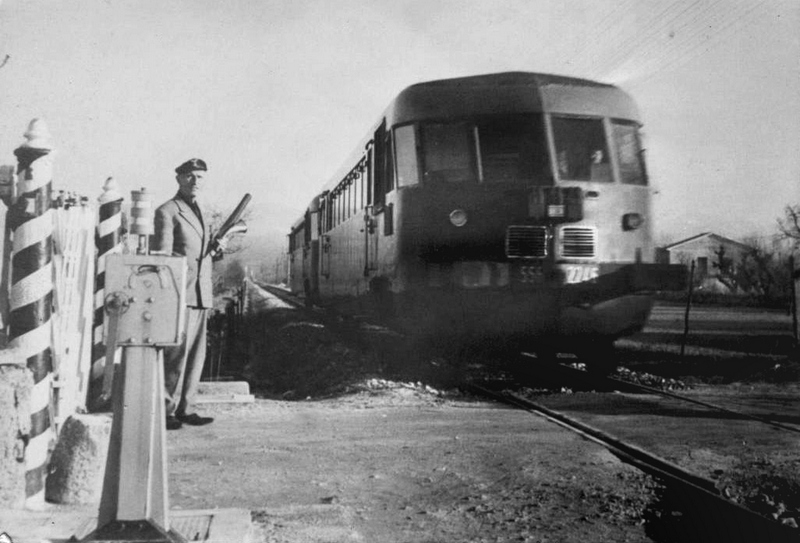At The Railway Station In Italy Posted by Serena on Nov 2, 2016 in Uncategorized
In English there’s a particular name for unhelpful public employees: jobsworth, an abbreviation of the phrase “I can’t let you do that, it’s more than my job’s worth”. The jobsworth seems to delight in upholding petty rules at the expense of humanity or even common sense. Isn’t it wonderful then, when you come across their counterpart, the public employee who is not only helpful but will even help you at the expense of the organisation that they work for!
The characters:
io, Serena,
mia cognata Linzi (my sister in law Linzi)
Colin, il compagno di Linzi (Linzi’s partner Colin)
la bigliettaia (the lady at the ticket office)
The setting:
la stazione ferroviaria di Pontremoli (Pontremoli railway station)
Serena: “Buongiorno, due biglietti per Venezia, per piacere“
Serena: “Good morning, two tickets for Venice, please”
Linzi consegna un foglio con l’orario dei treni: treno regionale da Pontremoli a Parma, treno Freccia Bianca da Parma a Bologna, treno Freccia Rossa da Bologna a Venezia, totale: 30 Euro.
Linzi hands over a paper with the train timetable: regional train from Pontremoli to Parma, Freccia Bianca train from Parma to Bologna, Freccia Rossa train from Bologna to Venice, total: 30 Euro.
La bigliettaia guarda il foglio e storce la bocca: “Mmm, devono per forza arrivare a Venezia a quest’ora?” chiede lei. “Se ci arrivassero un po’ più tardi potrebbero prendere tutti treni regionali e risparmierebbero dei soldi”
The lady at the ticket office looks at the paper and makes a face: “Mmm, do they really have to arrive in Venice a this time?” she asks. “If they arrived there a bit later they could catch all regional trains and save some money”

Arriva il treno regionale: un po’ più lento ma molto più economico. Photo: Creative Commons CC-BY-SA-2.5
Traduco a Linzi e Colin, spiegandogli che i treni Freccia Bianca e Freccia Rossa sono treni più veloci, ma anche più costosi, con obbligo di prenotazione dei posti, mentre i regionali sono un po’ più lenti ma molto più economici.
I translate to Linzi and Colin, explaining to them that the trains Freccia Bianca and Freccia Rossa are faster, but also more expensive, and you must book your seats, whilst the regional trains are a bit slower, but far more economic.
Serena, rivolta alla bigliettaia: “Vogliono sapere la differenza di prezzo e quanto tempo in più ci vuole per arrivare a Venezia”
Serena, talking to the ticket lady: “They want to know the difference in price and how much more it takes to get to Venice”
Bigliettaia: “Dunque, vediamo … con questi treni qui, il costo totale è di 110 euro, 55 a persona. Il prezzo di 30 euro riportato qui è valido solo se uno compra il biglietto con qualche giorno di anticipo”
Ticket lady: “Let’s see … with these trains, the total cost is 110 Euro, 55 Euro each. The 30 Euro price quoted here is only valid if you buy the ticket a few days in advance”
Poi fa la ricerca per i treni regionali … “Allora, da qui prendono lo stesso treno, poi a Parma aspettano 10 minuti in più per il treno per Bologna. Lì aspettano mezz’ora e arrivano a Venezia un’ora più tardi dell’orario scelto da loro. Totale, per due persone … 40 euro!”
Then she does a search for regional trains … “So, from here they’ll catch the same train, then in Parma they’ll wait 10 minutes longer for the train to Bologna. There they’ll wait half an hour and arrive in Venice an hour later than their chosen time. Total, for two people … 40 Euro!”
Quando traduco a Linzi e Colin, non hanno nessuna esitazione: va bene arrivare un’ora più tardi e risparmiare ben 70 euro!
When I translate, Linzi and Colin don’t hesitate at all: it’ll be fine to arrive an hour later and save 70 Euro!
La gentile bigliettaia stampa i due biglietti e il nuovo orario, Linzi e Colin pagano con la carta di credito, ancora increduli del risparmio.
The nice ticket lady prints their two tickets and their new timetable, Linzi and Colin pay with their credit card, still not believing how much they’ve saved.
“Thank you Serena, without your help we would have never saved all this money” say Linzi and Colin. “Don’t thank me, thank the bigliettaia” I reply.
“Grazie, grazie …”
“Non c’è di che!”

Build vocabulary, practice pronunciation, and more with Transparent Language Online. Available anytime, anywhere, on any device.




Comments:
Donna:
Thanks for showing me a new way to respond to “Grazie.” In Spanish you can say “por nada” or “de nada,” meaning literally for nothing. I’m wondering does Italian use an equivalent like “di niente” or “per niente.”
Serena:
@Donna Salve Donna, in italiano abbiamo molte espressioni per rispondere a ‘grazie’: prego, non c’è di che, di niente (per niente = not at all), si figuri (formal), figurati (informal) sono solo alcune delle più comuni.
Saluti da Serena
Joy Hudson:
Meraviglioso! Ogni giorno compro molto! Grazie